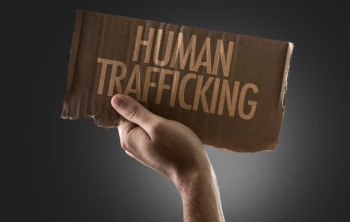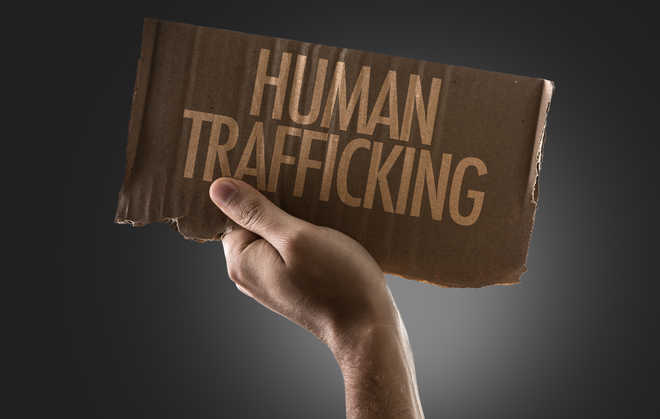
.png) Aarti
Aarti

Two upsetting news stories during the last fortnight have brought into sharp focus about the need to build awareness in order to uproot the menace of human trafficking. Reportedly, over 35 Punjabi women from Amritsar, Ludhiana, Ferozepur, Jalandhar, Moga, Mohali and Chandigarh who had dreams of earning handsome salaries in the Gulf had found themselves confined illegally in Oman. Some of them reportedly entered Oman from the UAE-Oman border with the help of touts on either side of the border.
News reports indicate that the hapless women from economically weaker families fell into the trap laid by illegal agents and touts in Punjab. But on reaching Oman, they were deputed for domestic work. Their salaries were never paid but were made to work from 5 am till midnight without a break.
The employers demanded around Rs 2.4 lakh to set them free, which implies they were sold by the agents. For resisting their atrocities, some were put in locked rooms without food.
After their time-bound visas expired they were unable to return to Punjab till overstay penalties amounting to approximately between Rs 2.5 lakh and Rs 3 lakh per person were paid to Oman courts or their employment bonds released by their sponsors upon payment. They lost their money to exploitative travel agents and had to endure untold physical and mental torture.
So far 13 of them have managed to return to their homes following the intervention of Rajya Sabha MP Vikramjit Singh Sahney from Punjab who has offered to furnish the penalty amounts for all the stranded women.
Hopefully, the rest of them trapped abroad would also return soon.
According to the United Nations Office of Drugs and Crime, most people are trafficked from Asia to Europe every year. Most of such trafficked persons are forced to work in agriculture, catering, construction, domestic work, restaurants, garments/textiles, entertainment and the sex industry.
Studies have shown that many unscrupulous traffickers lure unsuspecting job seekers promising them of green pastures abroad through fraudulent means. Next, when the victims are taken to other countries usually on tourist visas everything appears good. But on arrival, many may experience a language barrier thus preventing them from seeking help. It is here that the intended victim finally realises the truth, but it is too late. The criminal now uses threats of violence, withholds necessary resources and engages in explicit acts of abuse to keep the victims in their control.
The International Labour Organization estimates that globally 40 million are slaves or trafficked and exploited for sex or labour, or both.
In the second instance of harrowing abuse and exploitation of minor girls, an inter-state human trafficking racket was recently busted by the Ahmedabad rural police.
An investigation into the case of a 13-year-old girl who had gone missing in Kanbha led to the unravelling of the racket. It was found the minor was forced into at least 15 marriages. With the arrest of an 8-member gang, it was found that at least 15 minor girls were trafficked and subsequently sold as “wives” in Gujarat, Maharashtra and Rajasthan. Reportedly, the trafficked victims used to be lined up before “agents” dressed in sarees to appear older who would select a suitable girl for the buyer offering the highest price. Before being sold into marriages with aging bachelors who were unable to find brides within their communities, the innocent minor girls would be sexually assaulted by the gang members.
The ongoing probe is expected to provide more details.
According to the National Crime Records Bureau (NCRB), traffickers often exploit the vulnerabilities of people by making false promises of a new job, better living condition, support to their families, etc. Such promises may appear legitimate to people, but it makes many men, women and children easy prey for exploitation.
According to the NCRB snapshot for 2021, the number of human trafficking cases registered stood at 2189. The highest number of such cases were registered in Telangana (347 cases), Maharashtra (320 cases) and Assam (203 cases). Chargesheets were filed in 1645 cases. Trials were completed in 201 cases and 32 cases ended in conviction. The conviction rate was 16 percent.
During 2021, a total of 6533 people in the country were victims of human trafficking that includes 2471 males (1570 persons below 18 years of age) and 4062 females (1307 persons below 18 years of age). Among the top 10 States/UT, Odisha tops the list with 1475 human trafficking victims, followed by Maharashtra (918), Telangana (796), Delhi (509), Assam (460), Rajasthan (420), Bihar (384), Andhra Pradesh (338), Kerala (262) and Jharkhand (250). The purpose of human trafficking is forced labour (2704 persons); sexual exploitation for prostitution (2049); domestic servitude (475); forced marriage (182); petty crimes (32); child pornography (5); begging (7); removal of organs (6) and other reasons (753).
The main problem for vulnerable people to fall into the trap laid by human traffickers is the lack of awareness. In striking at the root of human trafficking, the thriving networks need to be smashed and innocent people such as labourers, women and children must be protected.
With social media largely being used by traffickers, children should be encouraged to never share personal information, including name and address, with strangers they meet online. It needs to be recognised that traffickers can create false profiles to lure potential victims. They should also be made to recognize that they may not be sending messages with a person matching the picture. Parents or guardians should warn children about accepting friend requests from people they do not know.
Better to be safe than feel sorry afterwards.